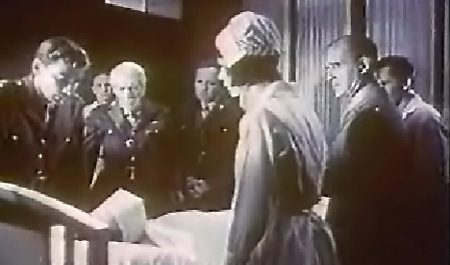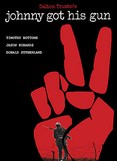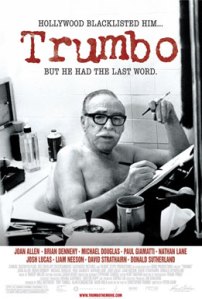The Loveless
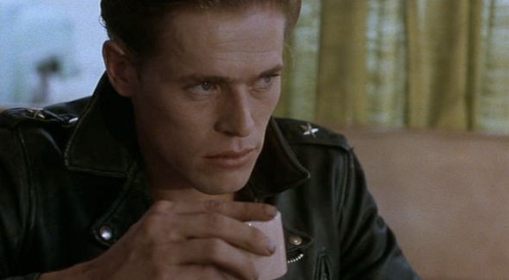 For the past couple weeks I’ve been slowly working my way through the work of director Kathryn Bigelow, whose latest film, The Hurt Locker, has been garnering major praise (I haven’t seen it myself). To be honest, her work left me fairly underwhelmed, but it wasn’t for lack of variety; she’s definitely not a director who works exclusively in just one or two genres. Have a look around Acme and see for yourself: she has a film each in Horror, Sci-Fi, Indy, War, and Juvee, plus three more in thriller (those three are easily the worst of the bunch: Blue Steel is Jamie Lee Curtis doing the female cop thing, with a god-awful Ron Silver as her crazed lover/nemesis; K-19: The Widowmaker is Harrison Ford doing his best Russian accent in the face of one of the most expensive independent films ever made — over $100 million, of which it failed to recoup even half; and then there’s Point Break, which needs no synopsis). All that being said, y’all should really check out her first feature-length, The Loveless.
For the past couple weeks I’ve been slowly working my way through the work of director Kathryn Bigelow, whose latest film, The Hurt Locker, has been garnering major praise (I haven’t seen it myself). To be honest, her work left me fairly underwhelmed, but it wasn’t for lack of variety; she’s definitely not a director who works exclusively in just one or two genres. Have a look around Acme and see for yourself: she has a film each in Horror, Sci-Fi, Indy, War, and Juvee, plus three more in thriller (those three are easily the worst of the bunch: Blue Steel is Jamie Lee Curtis doing the female cop thing, with a god-awful Ron Silver as her crazed lover/nemesis; K-19: The Widowmaker is Harrison Ford doing his best Russian accent in the face of one of the most expensive independent films ever made — over $100 million, of which it failed to recoup even half; and then there’s Point Break, which needs no synopsis). All that being said, y’all should really check out her first feature-length, The Loveless.
This was Willem Dafoe’s first film, playing the young leader of a biker gang on their way to Daytona who get waylaid in a small, Podunk southern town. I haven’t seen too many films — especially low-budget, independent films — that have gotten the ’50s biker-flick look so right, and Bigelow deserves major credit for that. The bikes, the cars, the costumes and the sets — everything looks exactly as it should, and it’s all topped off with a totally kickass rockabilly score with original stuff from Robert Gordon and John Lurie. But this isn’t just your typical biker-gang-wreaks-havoc flick, as Bigelow punctuates the film with all manner of disconcerting images: from the boredom and malaise on the faces of the local help, to the vaguely-illegal oil business run by town’s antagonistic alpha-male, to the punchy, nervous atmosphere of the bar in the film’s final scene. Working with just a few set pieces, the photography is thoughtful and consistently original, and Bigelow does a wonderful job of insinuating a great deal about the pain of characters’ lives without beating you over the head with any of it. Dafoe’s performance is the real stunner — and even more so given his age and inexperience. Watching him, it’s hard not to draw comparisons to Brando’s early stuff, as he plays the role with a remarkable softness that belies the intensity of his character. Young ‘uns only familiar with the man from his Spiderman role would do well to seek this one out.
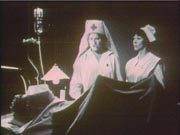 Recently, the people at Shout!Factory, an independent releasing company on the fast track to greatness in the post-Rhino era, had the good sense to put out a special release of a long unavailable independent film. (Shout is continuing to release also the beloved Mystery Science Theater, which Rhino had the good sense to deliver for a while until they went broke because not a huge market exists apparently for indie products because people are so homogenized and blah blah). Johnny Got His Gun, written and directed by Dalton Trumbo, is perhaps THE most inflammatory indictment not just of war, especially for the sake of “democracy”, but of any bureaucratic system led by those who would ignore individual determinism while claiming to represent the greater morality. It is the story of a soldier in WWI named Joe Bonham who winds up in a bizarre predicament after surviving a mortar shell explosion. Armless, legless, blind, and unable to speak, he is trapped inside what remains of his physical body, and at the mercy of those around him while he lies on a hospital table and tries to reckon with his despair and the idealism that led him down the road. Through memories and a few conversations with Jesus Christ, his life replays in his mind and for the audience.
Recently, the people at Shout!Factory, an independent releasing company on the fast track to greatness in the post-Rhino era, had the good sense to put out a special release of a long unavailable independent film. (Shout is continuing to release also the beloved Mystery Science Theater, which Rhino had the good sense to deliver for a while until they went broke because not a huge market exists apparently for indie products because people are so homogenized and blah blah). Johnny Got His Gun, written and directed by Dalton Trumbo, is perhaps THE most inflammatory indictment not just of war, especially for the sake of “democracy”, but of any bureaucratic system led by those who would ignore individual determinism while claiming to represent the greater morality. It is the story of a soldier in WWI named Joe Bonham who winds up in a bizarre predicament after surviving a mortar shell explosion. Armless, legless, blind, and unable to speak, he is trapped inside what remains of his physical body, and at the mercy of those around him while he lies on a hospital table and tries to reckon with his despair and the idealism that led him down the road. Through memories and a few conversations with Jesus Christ, his life replays in his mind and for the audience.